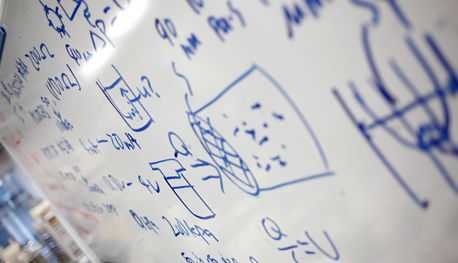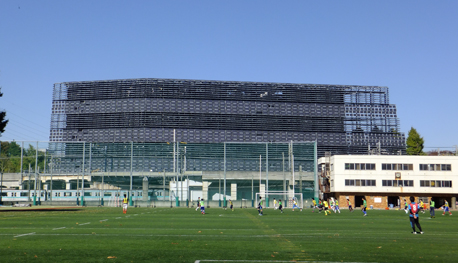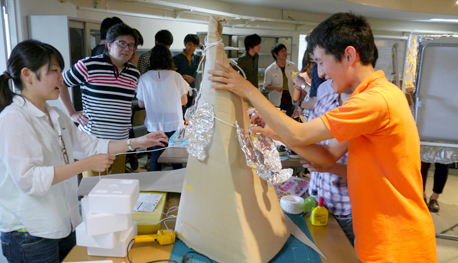Education
Mechanical Engineering
Undergraduate MajorCurriculum
Specialized education built on a broad foundation
— a solid footing for researchers and engineers
When students begin studying the Mechanical Engineering Major in the second year, they are first given instruction in subjects that are fundamental to Mechanical Engineering, namely Engineering Mechanics, Mechanics of Materials, Thermodynamics, Fundamentals of Fluid Dynamics, Dynamics of Machinery, and Machine Elements and Machine Drawing. Next, in addition to advanced courses in the foundational subjects, students get to expand their knowledge by choosing specialized courses in areas such as control, robotics, and mechatronics; precision engineering; machine design; and processing, production, and materials. Courses in synthetic areas, such as space engineering, are also available. Furthermore, through a required course called Creative Design of Mechanical Systems, which focuses on the development of creative skills, students gain training in putting their ideas and knowledge into practice. Finally, through Research-Related Courses, which includes the Independent Research Project, students learn methods to acquire and utilize knowledge and to investigate previously unexplored problems.
-
1st Year
- 100-Level Courses
-
Students in their first year of undergraduate studies receive basic education that centers on Institute-wide compulsory courses regardless of their discipline. The 100-level courses are designed to teach common, basic skills that are required of science and technology students. The aims of these courses are to provide knowledge and cultivate versatile intellect necessary for studying at the Institute.
-
2nd Year
3rd Year- 200-Level and 300-Level Courses
-
Students who complete their 100-level courses advance to study their undergraduate major. Courses at the 200- and 300-levels specific to the Mechanical Engineering Major are taken in accordance with the curriculum.
-
- Engineering Mathematics Courses
- Courses in engineering mathematics provide education in basic mathematics required for analyzing a wide variety of problems encountered in mechanical engineering. Students gain fundamental knowledge and analytical skills through courses such as Complex Function Theory, Differential Equations, Vector Analysis, Numerical Analysis, Probability Theory and Statistics, Signal Processing, and Spectral Analysis.
-
- Mechanics of Materials Courses
- Machines and structures be used safely and efficiently over long period. That requires safety against breakage of materials. Design engineers need to have a complete understanding of how materials deform and break when external forces are applied. Through courses in mechanics of materials, students learn about the strength, stiffness, and stability of materials when various forces are applied to the structural materials. The courses also provide the basic knowledge of the desired strengths for mechanical designers.
-
- Thermal Engineering Courses
- Isn't it odd that man is constantly plagued with energy shortage, when according to the laws of physics, energy is in fact conserved? Thermal engineering explains why this is. Students first learn the fundamental principles of thermodynamics and are then introduced to heat transfer and energy conversion. Afterwards, they study topics such as how energy converters work, giving them some practical and state-of-arts knowledge of the subject. The courses are designed to enable students to acquire knowledge systematically.
-
- Fluid Mechanics Courses
- Fluid mechanics is one of the core subjects in engineering and is used to deal with all kinds of engineering problems. Students first learn the basics of inviscid fluids, which form the basis of the principles of fluid mechanics. Students then go on to acquire basic knowledge of viscous fluids (a topic relevant to many devices) as well as more practical fluids, such as compressible fluids and electromagnetic fluids. Applications of these fluids and the fundamental computational fluid mechanics are also studied. The courses are designed to provide students with skills that will be useful in many engineering fields.
-
- Dynamics of Machinery Courses
- Students study vibrations generated in machines, structures, and their components, and learn how to suppress, control, and utilize them. Along with the basics of vibration, students learn how to describe vibrations using the equations of motion as well as theoretical ways to approach complex vibrations.
-
- Robotics and Mechatronics Courses
- These courses provide students with the basic knowledge necessary to design and make machines and robots that move. Types and operating principles of sensors and actuators are introduced, and ways to mathematically analyze and implement control are studied. Furthermore, through numerous exercises, students learn how these components are applied in robotics, gaining an understanding of kinematics, equilibrium of forces, and dynamics.
-
- Bioengineering Courses
- Courses in bioengineering cover human health, medicine and the environment. The aim of this field is to enrich the lives of people. Moreover, it is to build a foundation for human life that allows for sustainable development as well as to create new academic fields by blending natural science related to people, bioethics, the fundamentals of health and medicine, and environment with various specialized technologies of science and engineering.
-
- Precision Engineering Courses
- After learning the concepts of accuracy and precision and the importance of realizing precision machines, students study the basic principles and technology used to make, measure, and move machines with precision. Furthermore, students are introduced to basic processing principles for fabricating micro machines. Actual examples of precision machines and micro machines are also studied in these courses.
-
- Engineering Materials, Manufacturing Technology, and Production Engineering Courses
- These courses introduce students to materials and various processing methods that are essential when making mechanical devices. First, students learn about the various types of engineering materials, followed by the basics of various processing methods used in industry. Furthermore, students get to study systems used to efficiently make quality industrial products.
-
- Design and Drawing, Information Processing, and Creativity Development Courses
- These practical courses are designed to prepare students to become successful mechanical engineers in industry. Methods to configure machines and to design the structure and dimensions of machines to satisfy required specifications are studied.
-
- Space Engineering Courses
- Basics of space engineering are covered in the courses, including a general overview of space systems, orbit theories that form the basics of motion and control of rockets and satellites, attitude motion and control, and structure interaction problems. Fundamental ways of thinking about space system design are also developed through systematic learning.
-
- Applied Courses
- Mechanical engineering finds its uses in a wide range of industries and services. Topics such as automobiles and nuclear engineering are chosen and discussed in the courses from a mechanical engineering perspective. Students gain insight into advanced ideas and learn to examine matters in depth.
-
- Experiments Courses
- Four experiment courses of varying degrees of advancement, Basic, Applied, Advanced, and Frontal Experiments, are provided. These courses deal with a variety of topics that cover the broad discipline of mechanical engineering. Through experiments, students first deepen their understanding of knowledge obtained in the classroom. Following this, ways to accurately grasp phenomena and analyze them are learned. Finally, students become able to perceive problems from a mechanical engineering point of view.
-
- Communication Skills Courses
- These courses are designed to develop three vital qualities for scientists and engineers — the abilities to think logically and express opinions and communication skills.
-
-
4th Year
- 200-Level and 300-Level Courses
-
At the final stage of the 300 level is the Independent Research Project (equivalent to the Undergraduate Thesis Research that was in place previously). The project is intended to serve as a capstone for students to consolidate and reinforce all of the skills acquired in their Mechanical Engineering Major. Furthermore, they may choose to enroll in the Advanced Independent Research Project. The purpose of this course is to enhance the students' interest in scientific and technological research that began with the Independent Research Project. The course provides students with the opportunity to actively engage in their interests by taking part in science- and technology-related activities.
* The timeline depicts a standard case where students complete their bachelor's degree program in four years.
-
Entrance Examination
Students need to pass an entrance exam to advance from a bachelor's to a master's program. To advance from a master's to a doctoral program, students must pass an advancement assessment.
-
Graduate Majors
Master's Program
Doctoral Program- 400-Level, 500-Level, and 600-Level Courses
-
Students who complete the Mechanical Engineering Undergraduate Major may continue to study the discipline in more depth by taking the Mechanical Engineering Graduate Major. There are also closely related interdisciplinary graduate majors that students may advance to, which are the Energy Science and Informatics, Engineering Sciences and Design, Science and Technology for Health Care and Medicine, and Nuclear Engineering Graduate Majors.
-
- Department that offers this graduate major
-
- Mechanical Engineering
-
- Departments that offer this graduate major
-
- Departments that offer this graduate major
-
- Departments that offer this graduate major
-
- Departments that offer this graduate major
-





